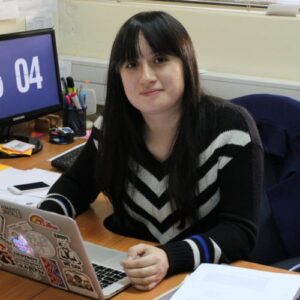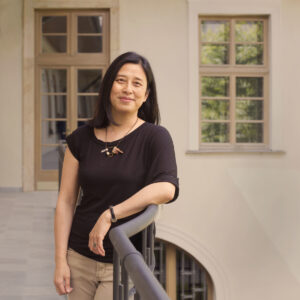Following an open call to VU researchers, we’re thrilled to announce that the four winning research visits have been confirmed. Read more about research visits -including previous ones- at the NI here. Below we describe the exciting work which is to come next semester, along with a picture of each visiting researcher.
| Guest | Project | Period |
| Joanna Ut Seong Sio (Palacký University Olomouc, Czech Republic) | Humorous AI Response System (HAIRS) | November 2024 |
| Anaïs Augé (Université catholique de Louvain, Belgium) | How the public uses, accepts and resists metaphors that shape online discussions about climate technologies |
November 2024 |
| David Tena-Cucala (University of Oxford, United Kingdom) | AI-Empowered Digital Political Science: Developing Knowledge Graphs and Explainable Predictive Models for Electoral Research |
October 2024 |
| Constanza Gajardo (Universidad de Concepción, Chile) | Integrating AI in Local Newsrooms: Towards a comparative approach to strategies, challenges, and insights | October 2024 |

Dr. Constanza Gajardo
The first 2024 Network Institute Research Visit involves a project titled “Integrating AI in Local Newsrooms: Towards a comparative approach to strategies, challenges, and insights.” The visit, lasting 19 days from September 30 to October 18, 2024, involves Dr. Constanza Gajardo from Universidad de Concepción collaborating with Dr. Reshmi Pillai at Vrije Universiteit Amsterdam. The project addresses the challenges faced by local newsrooms due to digitization and explores how AI can enhance journalistic practices. It aims to compare the experiences of newsrooms in the Global North and South, focusing on both the opportunities and ethical concerns of AI integration. The visit includes:
A one-day workshop/hackathon to foster collaboration between journalists and AI experts (date TBA)
The development of a joint research paper.

Dr. David Tena Cucala
Dr. David Tena-Cucala from the University of Oxford will embark on a 30-day research visit to VU Amsterdam, focusing on the intersection of AI and political science. From October 1 to October 30, 2024, it will also involve Dr. Jieying Chen, Dr. Benno Kruit, and Dr. Chendi Wang from Vrije Universiteit Amsterdam. The project, titled “AI-Empowered Digital Political Science,” aims to develop explainable predictive models for electoral research using advanced machine learning techniques1. Key outcomes include:
A joint seminar with political science and AI research groups.
Research/in-use papers: These papers would be emphasizing the integration and explanatory power of Graph Neural Networks (GNNs) in
understanding electoral dynamics. The papers will ideally be presented at the Web Conference (WWW), the International Conference on Learning Representations (ICLR), and the Extended Semantic Web Conference (ESWC) and published in the Political Analysis Journal.
Resource Paper: A significant contribution will be the creation of a knowledge graph based on the PelDem datasets3. The paper will outline the methodology, implementation, and potential applications of the knowledge graph. Possible venues will be ESWC and the International Conference on Information and Knowledge Management (CIKM).

Dr. Anaïs Augé
During the month of November, Dr. Anaïs Augé from Université catholique de Louvain will equally do a 30-day research visit to Vrije Universiteit Amsterdam, hosted by Dr. Gudrun Reijnierse. The project delves into how the public uses, accepts, and resists metaphors in online discussions about climate technologies12. Key activities include finalizing a research paper, presenting findings at a seminar, and hosting a one-day symposium. These events aim to foster interdisciplinary collaboration and enhance understanding of metaphorical communication in climate discourse.
Interactive workshop (Louvain, 1-2 November TBC): Focusing on innovative methodological aspects of tracking metaphorical interactions
Research meeting: This will present findings and be an opportunity for networking with drinks, aimed at members of the VU Language and Communication research group and other interested researchers.
One-day symposium (~25 participants): This would bring together Louvain and Amsterdam research groups interested in climate change, environmental, political, science communication, metaphor, and social media analysis.
Multiple conference abstracts: Aiming at international conferences on communication (e.g., Etmaal van de Communicatiewetenschap), science communication (Public Communication of Science and Technology), and metaphor (RaAM), all of which are scheduled to take place in 2025
Research paper: in an open-access academic journal specialising in environmental communication, science communication, or metaphor. Also publishing data-analytical procedures and annotated data set on the Open Science Framework.

Dr. Joanna Ut Seong Sio
Finally, from November 17 to November 30, 2024, Dr. Joanna Ut Seong Sio from Palacký University Olomouc will collaborate with Dr. Luis Morgado Da Costa at Vrije Universiteit Amsterdam. This 14-day visit will delve into the fascinating intersection of AI, robotics, and humor. The project, titled “Humorous AI Response System (HAIRS),” aims to enhance the comedic capabilities of AI through systematic reviews and hands-on experiments with the Pepper Robot, Leolani1. Key activities include:
A new dataset collected through a workshop where Amsterdam-based improvisers interact with Leolani
A public seminar at the VU showcasing preliminary results of the systematic review on ‘AI and Humor’ and of the interaction between improvisers and Leolani;
The first draft of a journal publication (to be submitted in 2025) describing the results of the systematic review and meta-analysis of studies on ‘AI and Humor
A conference publication (to be submitted in 2025) describing the experiments enabling Leolani to play improvisation games, and presenting a full analysis on the data collected (e.g. comparing the quality of humor between professional
comedians and Leolani)
